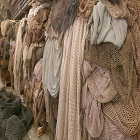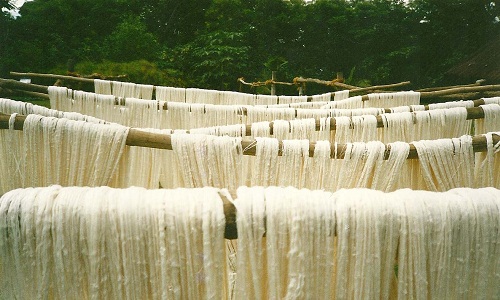"With growing focus on the 3Rs – Reduce, Reuse, Recycle, textile companies are finding ways and means to recycle fabrics. The key to the new generation of recycled synthetics is they are becoming as good in performance and function as their virgin counterparts. Cordura EcoMade, made from recycled polyester, is a case in point, with Cordura renowed for its high tenacity, the recycled alternative is specifically engineered to meet the fabric performance and durability specifications of the Cordura brand."

With growing focus on the 3Rs – Reduce, Reuse, Recycle, textile companies are finding ways and means to recycle fabrics. The key to the new generation of recycled synthetics is they are becoming as good in performance and function as their virgin counterparts. Cordura EcoMade, made from recycled polyester, is a case in point, with Cordura renowed for its high tenacity, the recycled alternative is specifically engineered to meet the fabric performance and durability specifications of the Cordura brand. Plain, dobby and rip stop weaves based on 600 denier yarn count can be incorporated, working perfectly for day packs. The process to produce Cordura EcoMade fabric reduces energy consumption and extends the use of the polyester.
Success stories

Patagonia has been diverting resources from the landfill since 1993 when they made the first fleece from recycled plastic bottles. Today they are using more recycled materials in their collection without sacrificing performance or quality. This season witnessed the launch of the recollection – styles made with all sorts of recycled materials, including 100 per cent recycled down, 100 per cent recycled wool and 100 per cent recycled polyester with 85 per cent recycled polyester labels, 80 per cent recycled zippers and 50 per cent recycled buttons. This is radically resourceful clothing, built to keep you warm, and they are ready to be recycled again when the time comes.
Take-Back-Systems – retailers taking responsibility
In another first, Patagonia is offering a worn wear repair service to its products, ensuring a longer life cycle to the consumer. Additionally, it is one of the brands to offer a take-back system for unwanted clothes and footwear, with more retailers pushing this closed-loop philosophy, reducing landfill of unwanted garments. But what happens when you take your old kit to the store, where does it go and how is it processed? I:Collect, part of the Soex Group, is an international provider for collection, reuse and recycling solutions for clothing and show, with national subsidiaries in Germany, the United Kingdom, Japan and the United States. Its take-back system and worldwide partner network, the company is able to both directly reuse clothing and pre-process the key ingredients before returning them to different production cycles.
The I:CO take-back system offers the retail industry the capability of assuming product responsibility by companies taking back clothing and shoes directly at their points of sale for reuse and recycling purposes. Consumers in more than 65 countries can deposit clothing and shoes conveniently at one of the many I:CO trading partners. In return, they receive a voucher for their next purchase. All the collected items are transported to sorting and recycling centers where every piece of clothing is sorted by hand and categorized for its best possible use.
Clothing that can still be worn, which account for up to 60 per cent of the total returns is preserved and sold according to quality aspects. The remaining 40 per cent is stripped and processed into different end products from recycled yarns, in particular garments wool and cotton, through to insulation materials. Buttons and hard materials retrieved from the shredding of garments are sorted out for use in the metalworking industry.
Full circle natural fibers
Filatures du Parc has developed a new yarn made from recyclable and recycled fibers with the patented manufacturing system. The recycled fibres are made from post-consumer jeans, collected through European partners. The jeans are selected and sorted on shades, like clear, medium and dark jeans. Filatures du Parc transforms the jeans fabrics into fibers and blends them with PET, which is recycled fiber polyester from plastic bottles.
The commonly used shredding system for fibre-recycling damages and shortens the fibers. As a result, the pilling quality is bad. The new fiber recycling process maintains fiber length which results in good quality yarns. Consequently, this new type of yarn has the same characteristics – sometimes even better – as yarn made from original fibres, particularly when it comes to breaking strength, elongation, abrasion, pilling and colour fastness.
Saving on natural resources
Synthetic and cellulosic fibers require large amounts of water and energy in the production process. This has a big impact on the environment. In the contrary, recycled fibers reduce the environmental impact of the production process. The patented yarn spinning process of Filatures du Parc also reduces dye pollution. Tessile Fiorentina has created a technical wool collection made out of reclaimed wool garments. Based in Prato, Italy, the company collects garments that they shred and spin into a recycled wool fiber. By sorting into colours prior to spinning, the recycled fibre does not need to be dyed, thereby saving water. It also offers the flexibility to play with different colours in one yarn to create something unique. The performance collection is woven in 100 per cent wool fabrics or blended with synthetics for added performance.












